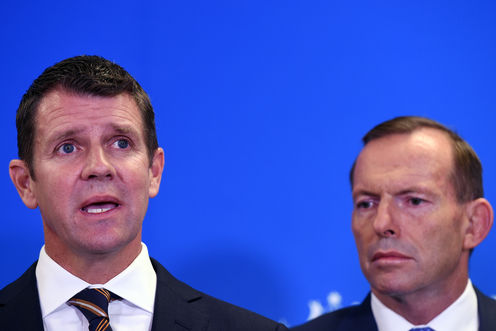
The March 28 New South Wales election and the battle over the prime ministership have become inextricably linked.
Tony Abbott has become a dead weight for the Baird government; the fevered speculation about the timing of a fresh assault on the prime minister is hanging over the state Liberals and will feed into polls that have already tightened.
The need to stop the federal disaster threatening the only big eastern state the Liberals now hold is one argument being mobilised by supporters of Malcolm Turnbull to advocate another leadership vote as soon as possible.
In an interview to launch our NSW election coverage, The Conversation asked Baird whether he would like to see the crisis resolved next week.
“There’s no doubt there’s challenges in Canberra, I’m not going to deny that … it is a difficult time. But I’m actually running to be premier of New South Wales.
“I am not going to buy into what might be happening down in Canberra, it’s not my role and responsibility,” he said, though he noted pointedly, “I would like Canberra to get on with the job of actually looking after the people it’s supposed to be representing.”
Assuming Tony Abbott is still prime minister, would he be campaigning in coming weeks with the premier and attending the formal launch of the campaign?
“Yes, I mean, of course. I mean he is the prime minister, he has invested a record amount of infrastructure into western Sydney, indeed across the state. He is doing his job as he should and we will be doing things together.”
Baird pledges to continue to vigorously take on the federal government to get a better deal on health.
“The biggest challenge facing this state and the nation is health funding. And what happened last federal budget is not sustainable.
“That was, the commonwealth and the federal government said ‘we are going to allocate a large part of the future growth in health costs from ourselves to the state governments’.
“The states do not have the capacity to meet those health costs on their own. The commonwealth has a critical role to play.
“Now, this will be front and centre of the white paper discussion on federalism, which is planned for the middle of this year. And that’s where it’ll be resolved. But I will be strongly making the case between now, the federal budget and that [white paper] discussion, saying there is no doubt that states cannot afford that health position … [Health] is the critical issue, because it is the largest cost to the budget and it’s growing at the fastest rate, and that is a very bad combination for a state tax base.”
Less than a year ago, Baird was suddenly thrust into the premier’s seat when Barry O’Farrell quit after giving incorrect evidence to the Independent Commission Against Corruption about a $3000 bottle of Grange he received.
His Liberal/National government is going into the election with a big buffer thanks to the bloodbath Labor took in 2011, and Baird is personally very popular.
But his election pitch includes an electricity “poles and wires” privatisation program. Privatisation proved lethal for the Newman government in Queensland, and the Baird push is being resisted by a well-organised union effort.
He acknowledges the “scare campaign” will have an impact, but argues “everyone in Macquarie Street knows that this is the right thing to do, in terms of leasing the poles and wires business”.
“But because of the scare campaigns that have gone in the past, no one’s wanted to touch it.
“And I think it’s about time that someone did the right thing for this state, was prepared to front up to the scare campaigns that were going to come, confront them with the truth, and confront them with the reality that this is the way we can fund the infrastructure we need.”
Baird says the election will be “tight”, with a swing inevitable because of the size of the last win. But when asked what he would consider a “good result”, he wouldn’t be drawn on numbers, apart from joking he would be happy with a win.
A recent Galaxy poll had the Coalition ahead 53-47%. Labor sources believe they could get a swing of about 10%, which would pick up about 15 to 17 seats – not enough for a win. Labor expects the Abbott factor to rate behind privatisation and cuts to services as the most pressing issues.
The premier’s smooth and moderate image contrasts starkly with the aggressive styles of both former Queensland premier Campbell Newman and Tony Abbott.
Asked if he thinks people have tired of aggressive approaches to politics, Baird said: “I don’t think there’s any right answer to that.”
“I think people can get a sense of … if a politician is being genuine. They can get a sense of if they understand that that politician actually can sense and understand the issues that are important to me and the challenges I’m facing in my day-to-day life, and they’re being honest with me.
“I think all of that is what’s important. I think people’s styles – well, people can be themselves. But I generally think that’s all the electorate’s looking for.
“Individuals are just saying they’re sick of politicians, they’re sick of politics, they want someone to stand there, to tell them the truth, to do it honestly, and to look after them.
“I think if you get that package right, you’ve got a capacity to connect with the electorate.”
March 28 is shaping up as a substantial test of connectivity.
You can listen to Mike Baird’s interview on the Politics with Michelle Grattan podcast here, read the transcript of the full interview here, and read more coverage of the 2015 NSW election.
Michelle Grattan does not work for, consult to, own shares in or receive funding from any company or organisation that would benefit from this article, and has no relevant affiliations.
